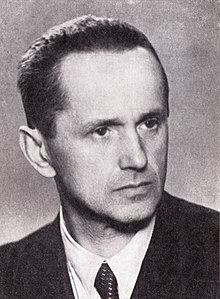Kazimierz Moczarski
Kazimierz Damazy Moczarski (born July 21, 1907 in Warsaw , Russian Empire ; † September 27, 1975 in Warsaw) was a Polish journalist and writer and, during the German occupation, head of the Office for Information and Propaganda of the Polish Underground Home Army .
Life
Kazimierz Moczarski studied law at Warsaw University and journalism at the Journalism College and received an internship at the Polish consulate in Paris in 1931 . 1932–1934 he studied in Paris at the Institute for International Law . After that he was a journalist until 1939. After the outbreak of war, he was a member of the Underground Home Army ( Armia Krajowa , AK) from 1940 . From August 1942 he worked in the Office for Information and Propaganda (BiP) of the AK. Moczarski took part in some AK combat actions. During the Warsaw Uprising in 1944, he headed the insurgents' radio station, and in April 1945 he took over the management of the BiP.
On August 11, 1945, he was arrested by the Stalinist authorities, tortured in prison and sentenced to ten years in prison. In 1948 a new trial began and in 1952 the death sentence followed. As an additional harassment of the prison administration, Moczarski was from March 2 to November 11, 1949 with the war criminal Jürgen Stroop , in 1943 commander of the SS, police and armed forces units for the suppression of the uprising in the Warsaw ghetto , in a cell of the prison in Mokotów housed.
After Stalin's death in 1953 , the Supreme Court commuted the death penalty to life imprisonment . Moczarski remained on death row until 1955. Moczarski was pardoned in 1956 and released on April 24, 1956. He was acquitted on December 11, 1956 in a rehabilitation process that he initiated. He became editor-in-chief of the daily newspaper Kurier Polski . Seriously ill, Moczarski retired in 1975 and died a few months later.
From the memories of the conversations with Stroop, the recordings Conversations with the Executioner ( Rozmowy z katem ) emerged from 1972 , which appeared in Poland in the journal Odra and were only published as a book posthumously in 1977. It was performed on April 17, 1979 by Peter Konwitschny at the Volksbühne Berlin ; Zygmunt Hübner and Andrzej Wajda provided the Polish premiere in 1977 at the Teatr Powszechny w Warszawie in Warsaw
Stroop
- Kazimierz Moczarski: Conversations with the executioner. The life of the SS group leader and lieutenant general of the police Jürgen Stroop, recorded in the Mokotów prison in Warsaw. German translation by Margitta Weber. With the articles: About Kazimierz Moczarski by Andrzej Szczypiorski , pp. 9–29 and A very ordinary German by Erich Kuby , pp. 421–427. Droste, Düsseldorf 1978, ISBN 3-7700-0511-2
- Kazimierz Moczarski: Conversations with the executioner. Translated from the Polish by Hubert Schumann. Verlag der Nation, East Berlin 1981.
literature
- Anna Machcewicz: Kazimierz Moczarski. Biography. Wydawnictwo Znak, Kraków 2009, ISBN 978-83-240-1096-7 ( Bohaterów biography ).
- Andrzej Krzysztof Kunert: Oskarżony Kazimierz Moczarski. Wydawnictwo Iskry, Warszawa 2006, ISBN 83-244-0016-8 ("Defendant Kazimierz Moczarski").
Web links
- Literature by and about Kazimierz Moczarski in the catalog of the German National Library
Individual evidence
- ↑ Machcewicz, Anna .: Kazimierz Moczarski: biografia . Wyd. 1st edition. Wydawn. Znak, Kraków 2009, ISBN 978-83-240-1096-7 , p. 198 .
- ↑ on Kurier Polski see also pl: Kurier Polski (dziennik popołudniowy) in the Polish Wikipedia
- ↑ Odra ( Memento of the original from December 4, 2000 in the Internet Archive ) Info: The archive link was inserted automatically and has not yet been checked. Please check the original and archive link according to the instructions and then remove this notice.
- ↑ Conversations with the executioner, text version: Zygmunt Hübner. From d. Polish. by Roswitha Buschmann, Berlin: Henschelverlag Kunst u. Society 1978 DNB
- ↑ on Teatr Powszechny w Warszawie see also pl: Teatr Powszechny w Warszawie in the Polish Wikipedia
| personal data | |
|---|---|
| SURNAME | Moczarski, Kazimierz |
| ALTERNATIVE NAMES | Moczarski, Kazimierz Damazy (full name) |
| BRIEF DESCRIPTION | Polish journalist, head of propaganda for the Polish Home Army |
| DATE OF BIRTH | July 21, 1907 |
| PLACE OF BIRTH | Warsaw |
| DATE OF DEATH | September 27, 1975 |
| Place of death | Warsaw |

